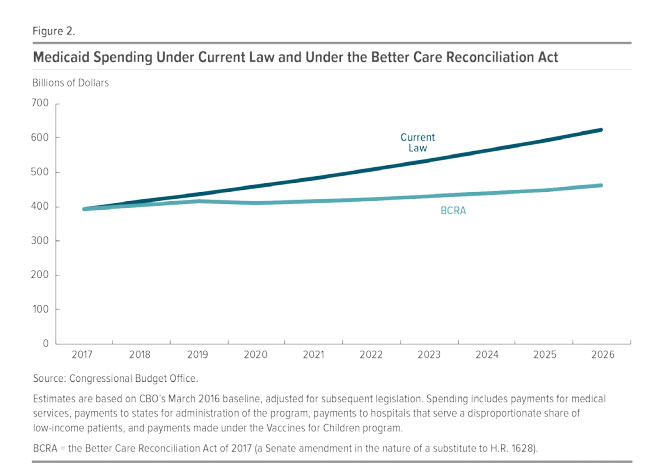Fact-check: The Senate Health Bill Cuts Medicaid








Does The Better Care Reconciliation Act of 2017 (AKA TrumpCare AKA the Senate ObamaCare bill) Cut Medicaid?
Trump and others have claimed that the Senate Bill (BCRA) doesn’t cut Medicaid, that is false. The BCRA freezes and reduces Medicaid funding.
UPDATE 2019: This plan never passed, and thus some specifics here are of historical interest only.
This amounts to hundreds of billions in cuts and tens of millions less being covered over time. This is true even though Medicaid spending, in general, goes up over time in raw dollars (See a clever graphic of this from VOX, or see the image at the top of the page from the CBO report).
Trump Recently Tweeted (and others made similar claims) that Democrats purposely misstated Medicaid under new Senate bill, and it goes up. This is the argument that The BCRA doesn’t cut Medicaid.
Fact-check: Medicaid expansion is phased out, and funding is frozen over time. Meanwhile, Medicaid spending is reduced over time. According to the CBO, about $772 Billion is cut from Medicaid by 2026 (page 13) and about 15 million fewer Medicaid enrollees are expected to be enrolled by 2026 (page 16) compared to the current law.
Here are some facts from the CBO Report:
- CBO and JCT estimate that enacting the Better Care Reconciliation Act of 2017 would reduce federal deficits by $321 billion over the coming decade and increase the number of people who are uninsured by 22 million in 2026 relative to current law (for a total of 49 million left uninsured). Part of the savings and the increased numbers of uninsured come from the Medicaid cuts.
- Specifically, of those who lose coverage, it is 15 million less from reducing Medicaid funding and 7 million less from reducing cost assistance and getting rid of the individual and employer mandates (keep in mind 75% of families on Medicaid are working poor).
- Thus, the largest savings would come from Medicaid cuts, and the largest increases in deficits would come from repealing or modifying tax provisions in the ACA that are not directly related to health insurance coverage, including repealing a surtax on net investment income and repealing annual fees imposed on health insurers.
Here is a Summary of what would change with Medicaid under the bill.
- Medicaid expansion: Obamacare’s Medicaid expansion is phased out over four years under this bill. 90% of the current federal funding would be provided in 2020, and it would decrease by 5% each year until 2023, after which it would be eliminated. People would not be allowed to join the expansion from 2020 onwards. In other words, it freezes expansion as the House bill did. On the plus side, tax credits will be available to people that fall off the expansion because there is no cut-off at 100% FPL. This means millions will lose access to coverage, and millions more who would have been covered in the future won’t be. However, the change happens more slowly than it did with the House bill.
- Medicaid spending: The Senate bill retains the House’s per capita cap for federal Medicaid spending. After 2025, however, growth in spending would shift from the consumer price index for medical care to the CPI for all goods, a lower level of growth. That means states will get less funding for Medicaid in general (not just expansion) and then rates will continue to decline after 2025. The Senate bill calls for a bigger cut than the House bill.
Read the full text: The Better Care Reconciliation Act of 2017 (AKA TrumpCare AKA the Senate ObamaCare bill).